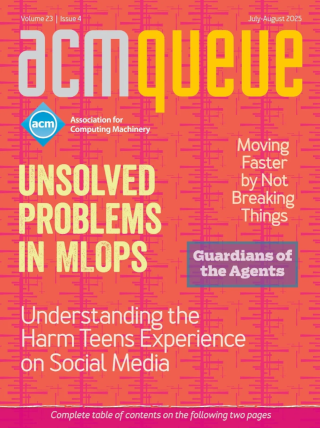
Computing without Processors:
Heterogeneous systems allow us to target our programming to the appropriate environment.
From the programmer’s perspective the distinction between hardware and software is being blurred. As programmers struggle to meet the performance requirements of today’s systems, they will face an ever increasing need to exploit alternative computing elements such as GPUs (graphics processing units), which are graphics cards subverted for data-parallel computing, and FPGAs (field-programmable gate arrays), or soft hardware.
The Robustness Principle Reconsidered:
Seeking a middle ground
In 1981, Jon Postel formulated the Robustness Principle, also known as Postel’s Law, as a fundamental implementation guideline for the then-new TCP. The intent of the Robustness Principle was to maximize interoperability between network service implementations, particularly in the face of ambiguous or incomplete specifications. If every implementation of some service that generates some piece of protocol did so using the most conservative interpretation of the specification and every implementation that accepted that piece of protocol interpreted it using the most generous interpretation, then the chance that the two services would be able to talk with each other would be maximized. Experience with the Arpanet had shown that getting independently developed implementations to interoperate was difficult, and since the Internet was expected to be much larger than the Arpanet, the old ad-hoc methods needed to be enhanced.
Microsoft’s Protocol Documentation Program:
A Discussion with Nico Kicillof, Wolfgang Grieskamp and Bob Binder
In 2002, Microsoft began the difficult process of verifying much of the technical documentation for its Windows communication protocols.
Interviewing Techniques:
Separating the good programmers from the bad
My work group has just been given approval to hire four new programmers, and now all of us have to interview people, both on the phone and in person. I hate interviewing people. I never know what to ask. I’ve also noticed that people tend to be careless with the truth when writing their resumes. We’re considering a programming test for our next round of interviewees, because we realized that some previous candidates clearly couldn’t program their way out of a paper bag. There have to be tricks to speeding up hiring without compromising whom we hire.
DSL for the Uninitiated:
Domain-specific languages bridge the semantic gap in programming.
One of the main reasons why software projects fail is the lack of communication between the business users, who actually know the problem domain, and the developers who design and implement the software model. Business users understand the domain terminology, and they speak a vocabulary that may be quite alien to the software people; it’s no wonder that the communication model can break down right at the beginning of the project life cycle.



